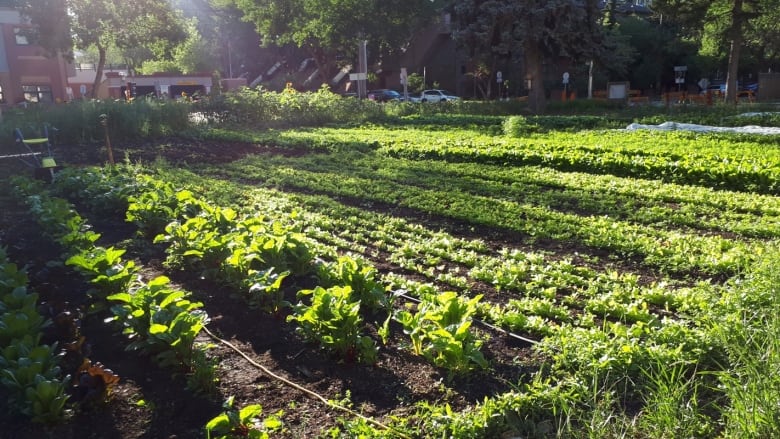Growth spurt: Edmonton's community garden program gets COVID rules and room to expand

It’s a green light in every sense of the word.
With so many public activities closed or curtailed, Edmonton’s community gardeners are ready to dig in following an announcement that as long as it’s done safely, seeding can go ahead this spring.
“Growing a garden is a practical, tangible action of community building,” said acting city manager Adam Laughlin, who announced the program is not only being allowed, but also expanded this season.
Proponents add that gardening is also a welcome mental-health break and a much-needed food source.
“We always talk about sustainable food, local food, and that’s a huge piece, that’s why we do it. But I think right now mental health is also a really big benefit from gardening,” said Danna Schumann, who leads the community garden committee in Ridgewood, a neighbourhood in southeast Edmonton.
“There’s just something really healing about getting your hands in the soil and working,” she told CBC Radio’s Edmonton AM on Wednesday. “I don’t know what it is but it relieves stress.
“Some people don’t have backyards so this let you get out of your apartment, go to a beautiful space, get your hands dirty, work in the garden and reap what you sow.”
Grow where you can plant it
The 42-plot Ridgewood project is one of more than 80 community gardens in Edmonton. The city’s Wednesday announcement — made, appropriately enough, on Earth Day — strongly endorses the program’s growth.
Residents are being urged to find spaces on their own property — back yards, front lawns or balcony pots — to grow vegetables.
As well, the city will support temporary community gardens being set up on public land.
David Aitken, the city’s manager of community standards and neighbourhoods, said efforts are underway to streamline the “onerous” application process for community gardens.
“The strategy looks at not only the existing lots, but potentially other properties — not just City of Edmonton but community league or other types of properties, both private and public,” Aitken said. “We’ll be exploring each of those in trying to move this forward.”
Coun. Aaron Paquette, who has expressed food security concerns since the pandemic’s start, called the program’s expansion great news.
“We’ve got some of the best agriculture land in the world. We tend to pave over it but we can actually utilize it,” he told CBC News earlier this month. “Everyone’s got a front yard, the city has a lot of land. We should be opening that up for people so that they can plant gardens.”
Garden produce can be eaten immediately, canned for future use or even shared with organizations like the food bank, he said, adding “I think what we need to do is make some big changes in how we’re approaching food and the agribusiness surrounding food.”
Food for thought
Food security is also a key concern of an Edmonton organization called Veg for Yeg, which grows vegetables on vacant land then sells it on a pay-what-you-will basis, according to founder Nicole Spring.
Going into its third season, Veg in Yeg is run by “three women farmers who are pretty passionate about building community, sustainable food systems and reducing food insecurity,” Spring told CBC Radio’s Edmonton AM on Monday.
“This year with the COVID crisis and with our food supply chains being threatened, it’s all the more important to give people the opportunity to grow their own food,” she said.
The organization has been operating its main garden on a vacant lot in the Garneau area, but she hasn’t heard yet whether the site will be developed this year. If it does, the garden will have to find a new space, Spring said.
Keeping a healthy distance
The city has created a list of requirements to ensure the garden activities are meeting public health standards.
These include removing or taping off public benches and picnic tables, creating a schedule to ensure no more than 15 people are on the property at a time, sanitizing common touch points like water taps, hoses and gates, and requiring gardeners to bring their own tools, disinfecting products and gloves.
Neither Spring and Schumann foresee any issue accommodating health measures in place as a result of the pandemic.

Schumann said some of the more “community” oriented aspects of the program — like work bees, potlucks and educational workshops — will be modified or cancelled this year.
“We’re going to keep physical distancing rules,” she said. “And if you’re sick, stay home and ask a gardener friend to water your plot and pull your weeds.”



